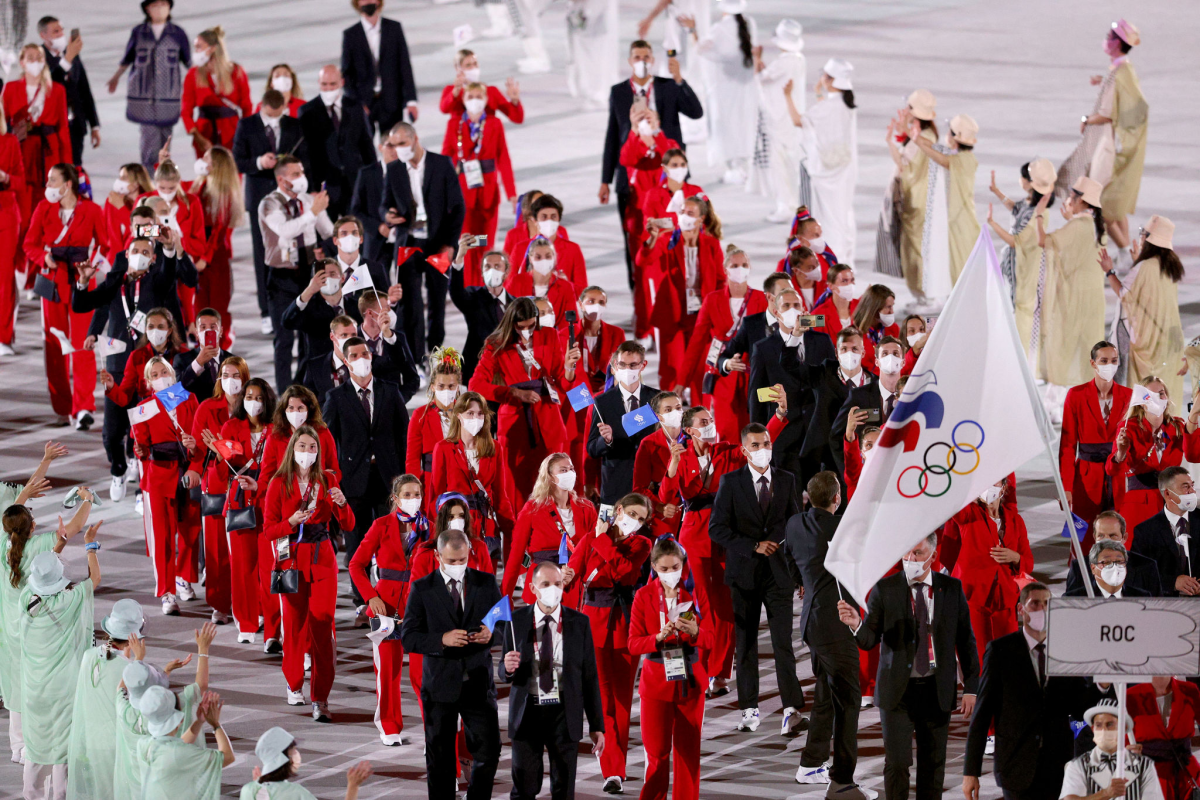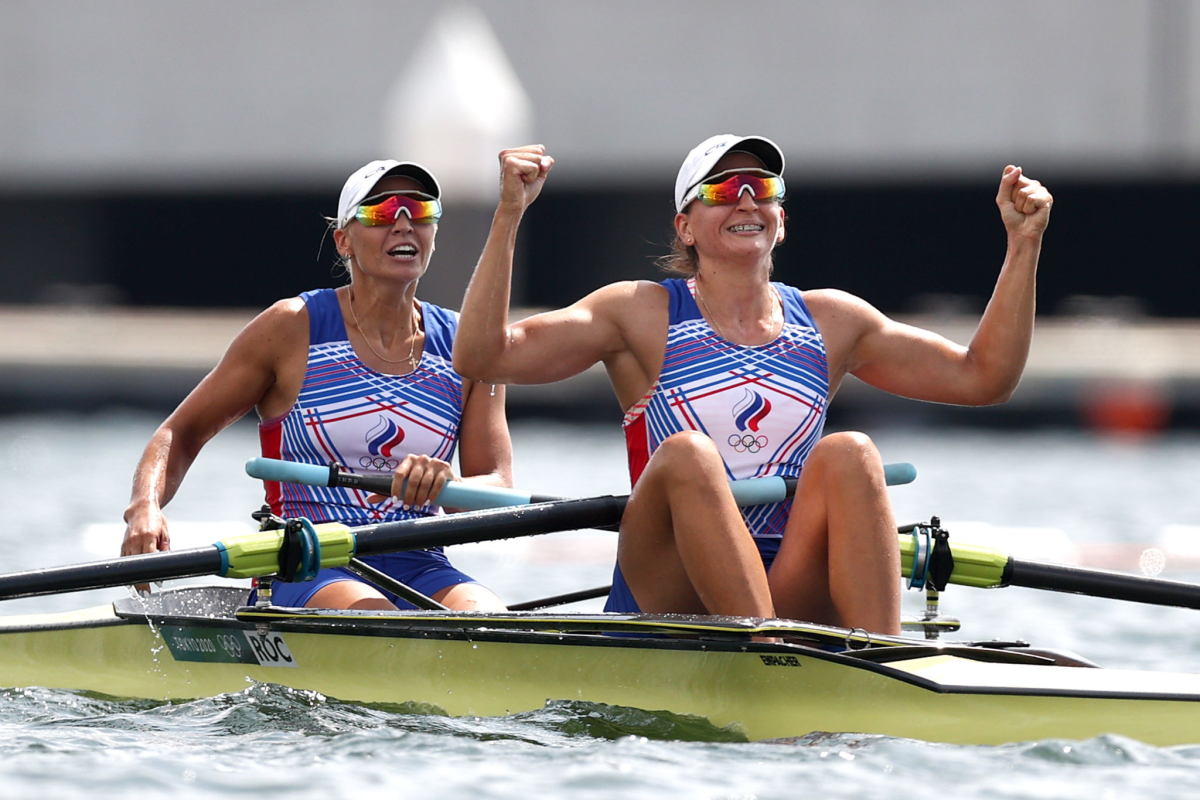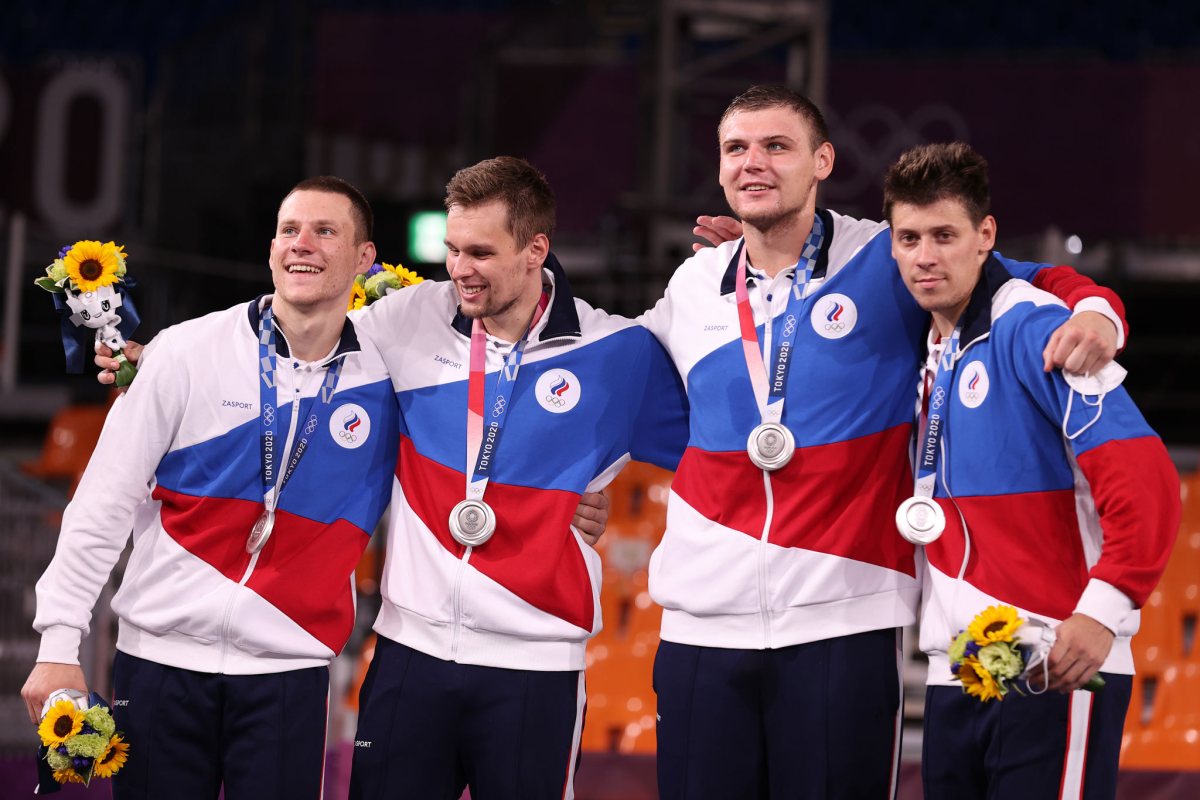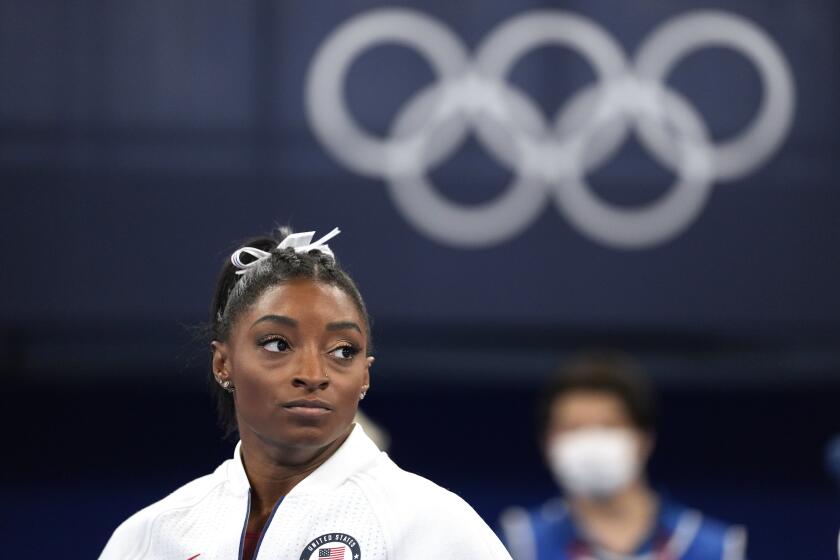How drug scandals and politics led to Russians competing as the ROC at Olympics

- Share via
TOKYO — Thousands of athletes from around the globe paraded into Olympic Stadium for the opening ceremony of the Tokyo Games, all but one team proudly carrying its nation’s flag.
Late in the procession, a large contingent nattily outfitted in red and black enthusiastically made its way across the stadium field. Two athletes held a pole flying a white flag that featured red, white and blue flames above the Olympic rings. Others behind them waved smaller versions of the same flag.
The athletes and officials were from Russia, but there was no visible sign of their country’s traditionally recognizable symbols.
In the aftermath of 2019 sanctions levied against Russia for state-sponsored doping, the International Olympic Committee determined that while Russian athletes could compete in these Games and the 2022 Beijing Winter Games, they could not do so under their country’s banner. They would be without their flag and, should they win gold medals, without their national anthem.
Russian athletes are competing as ROC, an acronym for “Russian Olympic Committee.”
U.S. gymnast Simone Biles pulls out of two events at the Tokyo Olympics because of mental health issues. Other athletes understand the struggle.
When ROC athletes win gold medals — they had seven through Thursday evening in Japan — they stand atop podiums while Tchaikovsky’s Piano Concerto No. 1 plays.
The IOC’s “quasi-compromise position” to allow Russian athletes to compete as ROC is “a bit odd,” said Angela Schneider, director of Western University’s International Centre for Olympic Studies in Canada.
“It really is a touchy balancing act,” said Schneider, a 1984 Olympic silver medalist in rowing. “And I can understand why people might be confused or … are trying to figure out what’s going on.”
The situation dates to doping allegations from the 2014 Winter Games in Sochi, Russia. In subsequent years, investigators found evidence that Russian athletes, coaches, doctors and sports officials participated in an orchestrated scheme, and that positive test results were covered up.
In 2019, the World Anti-Doping Agency announced Russia could not compete as a nation in the Olympics or world championships for four years but that athletes could compete as “neutrals” if they could persuade authorities they had not cheated.

Dmitry Medvedev, Russia’s prime minister at the time, dismissed the ban as “a continuation of the anti-Russian hysteria that has already grown chronic,” according to a report from Russia’s Tass state news agency.
Russia appealed the decision, and in 2020 the international Court of Arbitration for Sport reduced the punishment to two years. But Russia remained under sanction for the then-postponed Tokyo Games and the 2022 Winter Games in Beijing.
“’Clean’ athletes should not be held responsible for the actions of some unscrupulous athletes who committed anti-doping rule violations,” Mikhail Bukhanov, head of the Russian Anti-Doping Agency, said at the time. “The fact that WADA was unable to convince the CAS referees to punish ‘clean’ athletes from Russia, and along with them the Russian sports organizations and federations, is a victory of common sense.”
Last week, Benjamin Cohen, director general of the International Testing Agency, told reporters that Russian athletes were among the most tested going into the Games.
“Testing plans are defined based on a risk assessment taking into account the country risk, athlete risk, physiological risk, intelligence and previous anti-doping violations,” Cohen said.
“So, I will not hide that the Russian athletes come high in the risk assessments based on previous years and previous issues. But depending on the sport, discipline, results of those individual athletes, they are not treated differently to other athletes.
“Throughout our different federations’ programs, we tested many Russian athletes, and we are confident that they are actually tested a lot more than some other countries.”

This is not the first time that Russian athletes are competing without their country’s name.
In 1992, after the fall of the Berlin Wall and the breakup of the Soviet Union, many Russian athletes competed for “The Unified Team” at the 1992 Winter Games in Albertville, France, and the 1992 Barcelona Games.
At the 2018 Winter Olympics in Pyeongchang, South Korea, 168 Russian athletes competed as “Olympic Athletes from Russia.” They wore neutral uniforms and participated under the Olympic flag.
But members of Russia’s gold-medal winning hockey team mocked the sanctions by singing Russia’s national anthem from the medal podium.
“They just defied the IOC,” said Bill Mallon, past president of the International Society of Olympic Historians, who is with the U.S. Olympic & Paralympic Committee in Japan.
Three years later, Russian athletes are competing as ROC.
Mark Dyreson, a professor and sports historian at Penn State, said the IOC’s decision was “a very strange animal, both unique and not unique at the same time.”
“They wanted to punish Russia, but they realized Russia is really important to a good Olympics,” Dyreson said. “So, the slap on the wrist of no anthem, no flag, you know it’s not really the Russian nation doing this. But I don’t think they’re fooling anybody.”
Beach volleyball player Konstantin Semenov played in the 2012 and 2016 Olympics for Russia. Now he is competing for ROC.
On Monday, after he and partner Ilya Leshukov defeated a team from Australia, Semenov was asked what it felt like to compete for ROC but not Russia. He said in English that he did not “mind the situation for ROC and Russia,” and that he was focused on making the most of his training.
“This is the Olympic Games,” he said, adding, “together all countries. ... It’s Olympics. It doesn’t matter.”
Leshukov is playing in his first Olympics.
“For me, it’s the same,” he said through an interpreter. “I play for my country. … I think only about playing, so this is the most important thing for me.”
From 1952 to 1988, The United States and the former Soviet Union dominated the Olympic medal count. But in recent Olympics, China emerged as the United States’ greatest rival.
As of Thursday evening, the U.S. had won 37 medals, China 29, ROC 25 and Japan 22.
By any name, it seems, Russian athletes remain elite.
“The ghost of the Soviet empire is still there,” Dyreson said. “Unlike in other arenas where Russia has slid in terms of power, in Olympic sport they’re still doing pretty well.”
More to Read
Go beyond the scoreboard
Get the latest on L.A.'s teams in the daily Sports Report newsletter.
You may occasionally receive promotional content from the Los Angeles Times.









